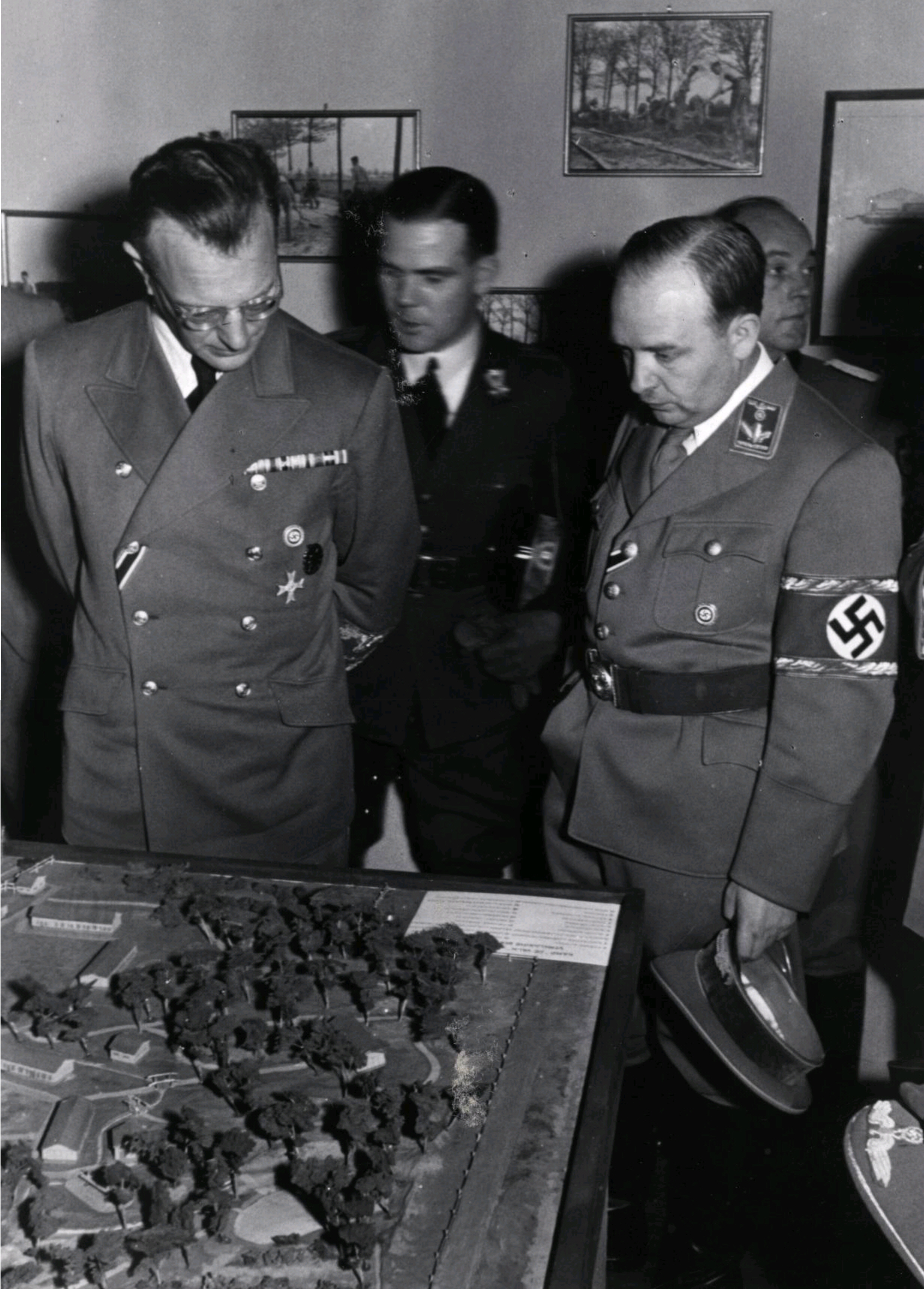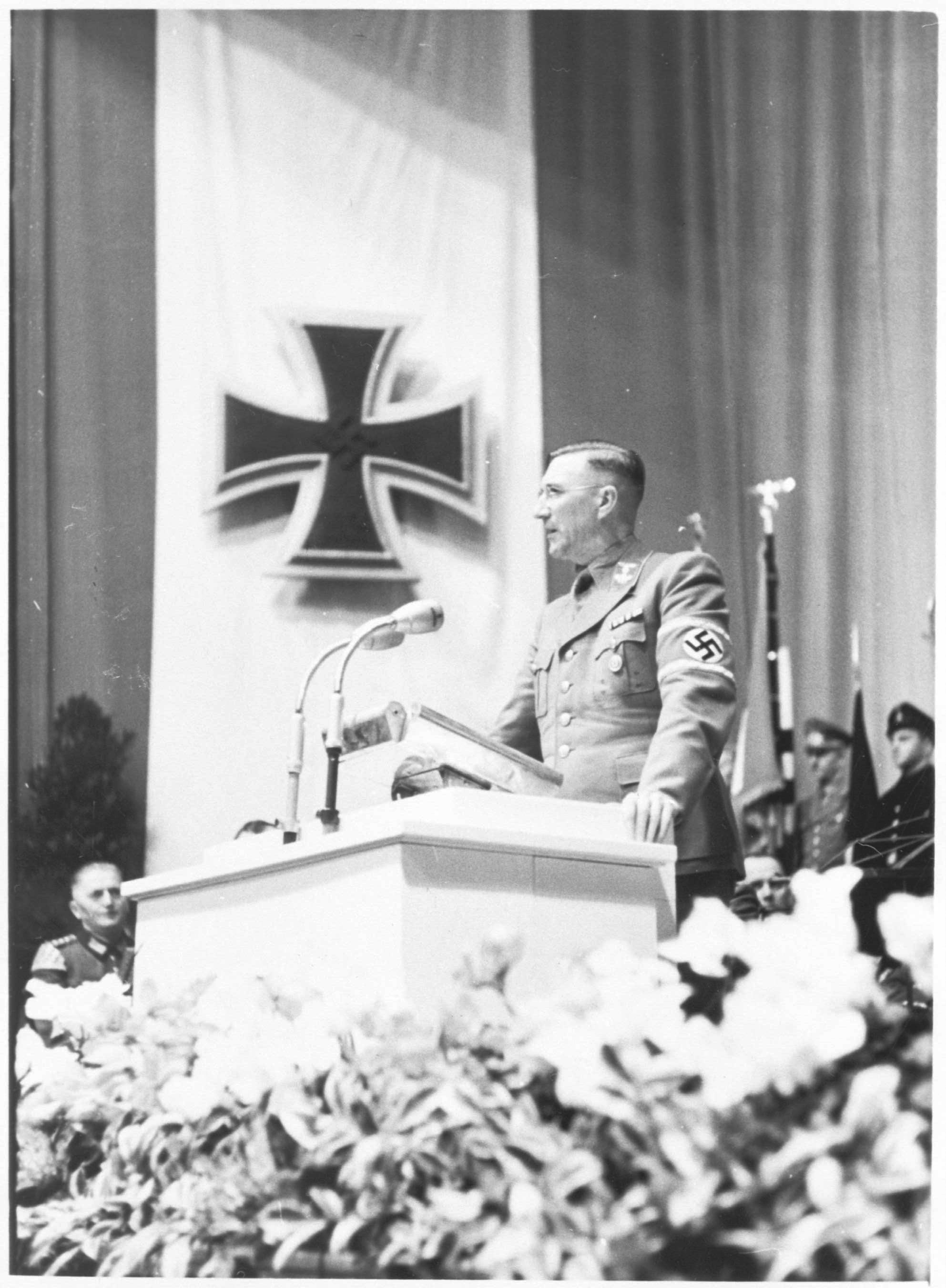|
Fritz Schmidt (Generalkommissar)
Fritz Schmidt (19 November 1903 in Eisbergen, nowadays part of Porta Westfalica, Westphalia – 26 June 1943 in Chartres) was the German Commissioner-General for Political Affairs and Propaganda in the occupied Netherlands between 1940 and 1943, one of four assistants to the Governor-General, Arthur Seyss-Inquart. Jacob Presser, ''Ashes in the Wind: The Destruction of Dutch Jewry'' (Wayne State University Press, 1968) He is regarded as a compromiser and promoted the interests of Anton Mussert and the Nationaal-Socialistische Beweging The National Socialist Movement in the Netherlands ( nl, Nationaal-Socialistische Beweging in Nederland, ; NSB) was a Dutch fascist and later Nazi political party that called itself a " movement". As a parliamentary party participating in leg ... (NSB). Schmidt died at the age of 39 on 26 June 1943, after he "fell, jumped, or was pushed out of a train" and was succeeded by Wilhelm Ritterbusch. References 1903 births 1943 deaths Ne ... [...More Info...] [...Related Items...] OR: [Wikipedia] [Google] [Baidu] |
Porta Westfalica
Porta Westfalica () is a town in the district of Minden-Lübbecke, in North Rhine-Westphalia, Germany. The name "''Porta Westfalica''" is Latin and means "gate to Westphalia". Coming from the north, the gorge is the entry to the region of Westphalia. The name was coined by scholars of the 19th century. History The town Porta Westfalica was established in 1973 by merging fifteen villages surrounding the gorge. The centre of the modern town is the former village of Hausberge, which was first mentioned in 1096. The Emperor William Monument was erected near the town by the then Prussian Province of Westphalia between 1892 and 1896Information board with the titl''Emperor William Monument''at the northern approach to the monument at commons.wikimedia.org The monument, which is around 88 metres high, is classified as one of Germany's national monuments. From 18 March 1944 until 1 April 1945 a concentration camp was established in the Barkhausen quarter. From 1 February 1945 ... [...More Info...] [...Related Items...] OR: [Wikipedia] [Google] [Baidu] |
Westphalia
Westphalia (; german: Westfalen ; nds, Westfalen ) is a region of northwestern Germany and one of the three historic parts of the state of North Rhine-Westphalia. It has an area of and 7.9 million inhabitants. The territory of the region is almost identical with the historic Province of Westphalia, which was a part of the Kingdom of Prussia from 1815 to 1918 and the Free State of Prussia from 1918 to 1946. In 1946, Westphalia merged with North Rhine, another former part of Prussia, to form the newly created state of North Rhine-Westphalia. In 1947, the state with its two historic parts was joined by a third one: Lippe, a former principality and free state. The seventeen districts and nine independent cities of Westphalia and the single district of Lippe are members of the Westphalia-Lippe Regional Association (''Landschaftsverband Westfalen-Lippe''). Previous to the formation of Westphalia as a province of Prussia and later state part of North Rhine-Westphalia, ... [...More Info...] [...Related Items...] OR: [Wikipedia] [Google] [Baidu] |
Chartres
Chartres () is the prefecture of the Eure-et-Loir department in the Centre-Val de Loire region in France. It is located about southwest of Paris. At the 2019 census, there were 170,763 inhabitants in the metropolitan area of Chartres (as defined by the INSEE), 38,534 of whom lived in the city ( commune) of Chartres proper. Chartres is famous worldwide for its cathedral. Mostly constructed between 1193 and 1250, this Gothic cathedral is in an exceptional state of preservation. The majority of the original stained glass windows survive intact, while the architecture has seen only minor changes since the early 13th century. Part of the old town, including most of the library associated with the School of Chartres, was destroyed by Allied bombs in 1944. History Chartres was one of the principal towns in Gaul of the Carnutes, a Celtic tribe. In the Gallo-Roman period, it was called ''Autricum'', name derived from the river ''Autura'' (Eure), and afterwards ''civitas Carnutum ... [...More Info...] [...Related Items...] OR: [Wikipedia] [Google] [Baidu] |
Netherlands
) , anthem = ( en, "William of Nassau") , image_map = , map_caption = , subdivision_type = Sovereign state , subdivision_name = Kingdom of the Netherlands , established_title = Before independence , established_date = Spanish Netherlands , established_title2 = Act of Abjuration , established_date2 = 26 July 1581 , established_title3 = Peace of Münster , established_date3 = 30 January 1648 , established_title4 = Kingdom established , established_date4 = 16 March 1815 , established_title5 = Liberation Day , established_date5 = 5 May 1945 , established_title6 = Kingdom Charter , established_date6 = 15 December 1954 , established_title7 = Caribbean reorganisation , established_date7 = 10 October 2010 , official_languages = Dutch , languages_type = Regional languages , languages_sub = yes , languages = , languages2_type = Recognised languages , languages2_sub = yes , languages2 = , demonym = Dutch , capital = Amsterdam , largest_city = capital , ... [...More Info...] [...Related Items...] OR: [Wikipedia] [Google] [Baidu] |
Arthur Seyss-Inquart
Arthur Seyss-Inquart (German: Seyß-Inquart, ; 22 July 1892 16 October 1946) was an Austrian Nazi politician who served as Chancellor of Austria in 1938 for two days before the ''Anschluss''. His positions in Nazi Germany included "deputy governor to Hans Frank in the General Government of Occupied Poland, and '' Reich commissioner'' for the German-occupied Netherlands" including shared responsibility "for the deportation of Dutch Jews and the shooting of hostages". During World War I, Seyss-Inquart fought for the Austro-Hungarian Army with distinction. After the war he became a successful lawyer, and went on to join the governments of Chancellors Engelbert Dollfuss and Kurt Schuschnigg. In 1938, Schuschnigg resigned in the face of a German invasion, and Seyss-Inquart was appointed his successor. The newly installed Nazis proceeded to transfer power to Germany, and Austria subsequently became the German province of Ostmark, with Seyss-Inquart as its governor (''Reichsstatt ... [...More Info...] [...Related Items...] OR: [Wikipedia] [Google] [Baidu] |
Jacques Presser
Jacob (Jacques) Presser (24 February 1899 in Amsterdam – 30 April 1970 in Amsterdam) was a Dutch historian, writer and poet who is known for his book ''Ashes in the Wind (The Destruction of the Dutch Jews)'' on the history of the persecution of the Jews in the Netherlands during World War II. Presser made a significant contribution to Dutch historical scholarship, as well as to European historical scholarship. Early life Presser was born in the former Jewish quarter of Amsterdam. His family was rather poor (his father was a diamond cutter), and his parents, who were secular Jews, had socialist leanings. Presser himself in later life, also gravitated towards the left. As a child, he lived for a while with his family in Antwerp, Belgium. He attended the University of Amsterdam after he finished a commercial vocational college and having worked in an office for two years. At the university, he studied history, art history, and Dutch. He graduated ''cum laude'' in 1926. Then ... [...More Info...] [...Related Items...] OR: [Wikipedia] [Google] [Baidu] |
Anton Mussert
Anton may refer to: People *Anton (given name), including a list of people with the given name *Anton (surname) Places *Anton Municipality, Bulgaria **Anton, Sofia Province, a village *Antón District, Panama **Antón, a town and capital of the district *Anton, Colorado, an unincorporated town *Anton, Texas, a city *Anton, Wisconsin, an unincorporated community * River Anton, Hampshire, United Kingdom Other uses *Case Anton, codename for the German and Italian occupation of Vichy France in 1942 *Anton (computer) Anton is a massively parallel supercomputer designed and built by D. E. Shaw Research in New York, first running in 2008. It is a special-purpose system for molecular dynamics (MD) simulations of proteins and other biological macromolecules. ..., a highly parallel supercomputer for molecular dynamics simulations * ''Anton'' (1973 film), a Norwegian film * ''Anton'' (2008 film), an Irish film * Anton Cup, the championship trophy of the Swedish junior hockey ... [...More Info...] [...Related Items...] OR: [Wikipedia] [Google] [Baidu] |
Nationaal-Socialistische Beweging
The National Socialist Movement in the Netherlands ( nl, Nationaal-Socialistische Beweging in Nederland, ; NSB) was a Dutch fascist and later Nazi political party that called itself a " movement". As a parliamentary party participating in legislative elections, the NSB had some success during the 1930s. Under German occupation, it remained the only legal party in the Netherlands during most of the Second World War. Party history 1931–1940 The NSB was founded in Utrecht in 1931 during a period when several nationalist, fascist and Nazi parties were founded. The founders were Anton Mussert, who became the party's leader, and Cornelis van Geelkerken. The party based its program on Italian fascism and German Nazism: however, unlike the latter, before 1936 the party was not anti-semitic and even had Jewish members. In 1933, after a year of building an organization, the party organized its first public meeting, a '' Landdag'' in Utrecht which was attended by 600 party milita ... [...More Info...] [...Related Items...] OR: [Wikipedia] [Google] [Baidu] |
Wilhelm Ritterbusch
Wilhelm (Willi) Friedrich Adolf Ritterbusch (3 July 1892, in Werdau, Germany – 10 April 1981, in Skelund, Denmark), was a Nazi Party political functionary. Among other positions, he was the German ''Generalkommissar zur Besonderen Verwendung'' ("Commissioner-General for Special Duties"), directing the political affairs and propaganda in the Netherlands in World War II, occupied Netherlands from the middle of July 1943 until 7 May 1945, the end of World War II. Family Wilhelm Ritterbusch was a son of Hermann Ritterbusch a bricklayer from Zschakau (now Beilrode) a municipality in the district of Nordsachsen, in Saxony, Germany. His brother, Paul Ritterbusch was one of the most prominent NS science functionaries. Another brother, Fritz Ritterbusch, was a SS-Hauptsturmführer, Hauptsturmführer of the ''Waffen-SS'' and ''Allgemeine-SS'', a member of the guard staff of several Nazi concentration camps, and the commander of the Trautenau-Parschnitz camp. Life and work Ritterbusch pa ... [...More Info...] [...Related Items...] OR: [Wikipedia] [Google] [Baidu] |




.jpg)
